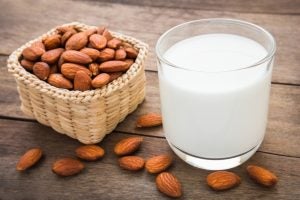Plant-based products’ use of the term “milk” has caused a stir for decades among consumers, dairy producers, and the companies that produce milk alternatives. Now, the U.S. Food and Drug Administration announced draft recommendations for the industry — particularly for plant-based foods marketed and sold as alternatives to milk.
A comment period from 2018 led the FDA to conclude that while consumers generally understand that plant-based milk alternatives (PBMA) do not contain milk, and they regularly choose these products because they don’t contain milk, many consumers are not aware of the nutritional differences between PBMA and real milk products. For example, almond- or oat-based PBMA products may contain calcium and be consumed as a source of calcium, but their overall nutritional content is not similar to milk and fortified soy beverages, and they are not included as part of the dairy group in the federal Dietary Guidelines 2020-2025.
»Related: Report zeros in on plant-based product use throughout the U.S.
The FDA recommends that a plant-based milk alternative product that includes the term “milk” in its name (e.g., “soy milk” or “almond milk”), and that has a nutrient composition that is different than milk, include a voluntary nutrient statement that conveys how the product compares with milk. For example, the label could say, “Contains lower amounts of Vitamin D and calcium than milk.”
Jim Mulhern, President and CEO of the National Milk Producers Federation, commented, saying, “Today’s FDA announcement is a step toward labeling integrity for consumers of dairy products, even as it falls short of ending the decades-old problem of misleading plant-based labeling using dairy terminology. By acknowledging both the utter lack of nutritional standards prevalent in plant-based beverages and the confusion over the nutritional value that’s prevailed in the marketplace because of the unlawful use of dairy terms, FDA’s proposed guidance today will provide greater transparency that’s sorely needed for consumers to make informed choices.”
The variety of alternative products available in the marketplace has greatly expanded from soy, rice, and almond to include cashew, coconut, flaxseed, hazelnut, hemp seed, macadamia nut, oat, pea, peanut, pecan, quinoa, and walnut-based beverages. Although these products are made from liquid-based extracts of plant materials, such as tree nuts, legumes, seeds, or grains, they are frequently labeled with names that include the term “milk.”

Amarita, Shutterstock
“Today’s draft guidance was developed to help address the significant increase in plant-based milk alternative products that we have seen become available in the marketplace over the past decade,” said FDA Commissioner Dr. Robert M. Califf. “The draft recommendations issued today should lead to providing consumers with clear labeling to give them the information they need to make informed nutrition and purchasing decisions on the products they buy for themselves and their families.”
»Related: Lawsuit accuses Beyond Meat of false protein claims
Dairy foods, including milk, are recommended by the Dietary Guidelines as part of a healthy eating pattern and contribute multiple key nutrients, including protein and vitamins A and B-12, along with calcium, potassium and vitamin D, which are currently under-consumed.
The Dietary Guidelines only includes fortified soy beverages in the dairy group because their nutrient composition is similar to that of milk. However, the nutritional composition of PBMA products varies widely within and across types, and many PBMAs do not contain the same levels of key nutrients as milk.
“Getting enough of the nutrients in milk and fortified soy beverages is especially important to help children grow and develop, and parents and caregivers should know that many plant-based alternatives do not have the same nutrients as milk,” said Susan T. Mayne, Ph.D., director of the FDA’s Center for Food Safety and Applied Nutrition. “Food labels are an important way to help support consumer behavior, so we encourage the use of the voluntary nutritional statements to better help customers make informed decisions.”
The National Milk Producers Federation, however, holds that while the recommendation is a step in the right direction, the decision still permits non-milk beverages to inappropriately use dairy terminology. Mulhern writes, “We reject the agency’s circular logic that FDA’s past labeling enforcement inaction now justifies labeling such beverages as ‘milk’ by designating a common and usual name. Past inaction is poor precedent to justify present and future inaction.”
The Federation plans to continue to work in Congress to pass the DAIRY PRIDE Act, which would direct the FDA to enforce rules and push the FDA to clarify that dairy terms are for true dairy products, not plant-based alternatives.


